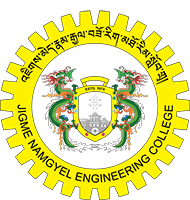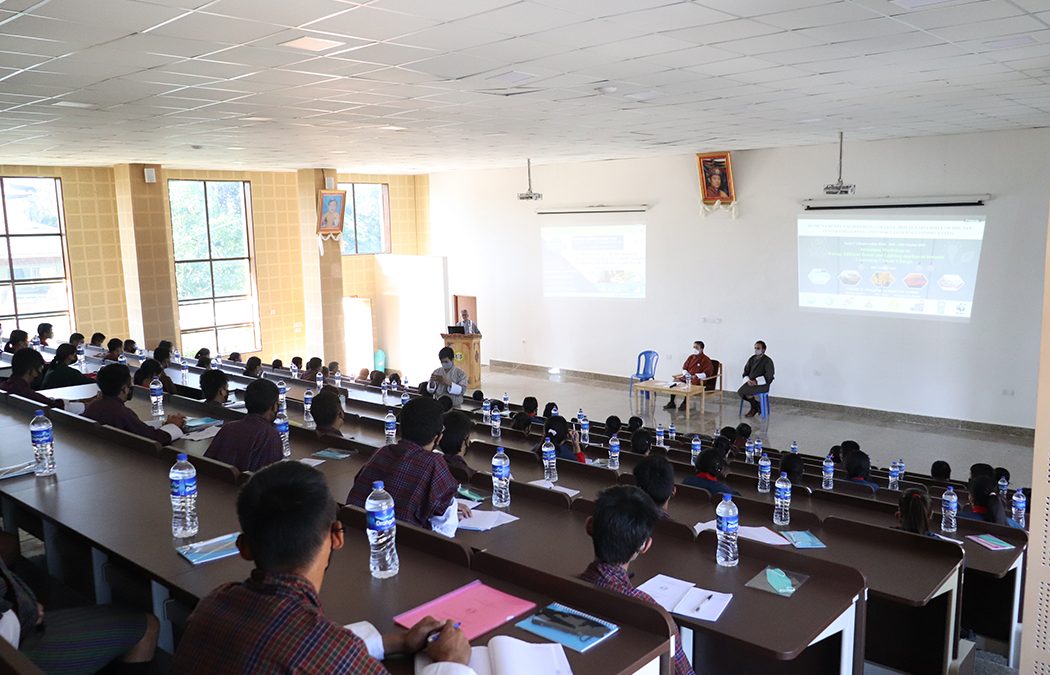To mark the ‘Climate Action Week’, Centre for Lighting and Energy Efficiency Studies (CLEES), JNEC, and Maintenance Hobby Club (MHC), conducted a day-long awareness workshop on Energy Efficient Power and Lighting appliances on 28th October, 2021. The awareness workshop was particularly tailored for the students of Garpawoong Middle Secondary School (GMSS) and Dungsam Academy to advocate, discuss and share ideas on climate change. A total of 95 students from two schools and JNEC participated in the workshop.
The workshop aimed to help students understand what climate change is, its impacts, emphasize on how human actions are instrumental to climate change, and means to combat Climate Change at individual level.
The President urged that everyone needs to act now to fight climate change. Among other ways to help fight climate change, one simple thing we can do is “turning off the lights when not in use, using longer life bulbs, and avoiding the use of artificial lights.”
The president also highlighted on what JNEC has been doing so far to help and benefit the local community. He said that the ‘community outreach’ is one of the key missions of the college, particularly in the transfer of knowledge and skills, and that the college is constantly looking for opportunities through two research centers namely Center for Appropriate Technology (CAT) and the Centre for Lighting and Energy Efficiency Studies (CLEES).
He said that JNEC in the past has also collaborated with Samdrup Jongkhar Initiative (SJI) to carry out several activities to help the local communities.
The three sessions of the workshop informed the participants on the harmful effects of power generation related to pollution of air, water and land, and how such pollution impact humans, animals and plant health. The workshop then deliberated on how opting to shift to the use of energy efficient appliances (both lighting and power) could lead to reducing pollution and combat Climate Change. The sessions also discussed the economic benefits of saving energy at individual level, at national level and combating climate change at global level. The benefits of extending the life and usage of appliance by carrying out repair and maintenance was also discussed.
The participants, through the feedback, reported that the program was very beneficial and timely. They were able to understand the impact of Climate Change and learn the causes and sources of environmental pollution and global warming. They felt such programs, if extended to larger population, including rest of the schools’ students and local community, would bring broader realization in the society. They also assured to share the information to their friends, family and neighbors, and convince them to save energy to whatever extent possible.
The workshop is sponsored by National Environment Commission (NEC) of Bhutan and UNDP through Royal University of Bhutan (RUB).
To conclude, JNEC would like to acknowledge the magnanimous support of the sponsors and partners (National Environment Commission, Royal University of Bhutan, United Nations Development Programme, Bhutan Ecological Society, World Wild Life Fund Bhutan, Bhutan Foundations and United Nations Capital Development Fund) toward making this event a great success. JNEC will continuously commit to work for the cause of the global environment at its own capacity.
The Centre for Lighting and Energy Efficiency Studies (CLEES) at Jigme Namgyel Engineering College (JNEC) was established through Erasmus+ Project, “Promoting Energy Efficient Lighting Education in Nepal and Bhutan (ELNAB)” in 2018 with the objective to enhance research activities at the college. ELNAB is a higher education capacity building project to support Nepali and Bhutanese Higher Education institutes to provide education that promotes sustainable socio-economic development. The centre has set a state of art laboratory with high-end equipment (portable goniometer, integrating sphere, luminance meters, illuminance meters and power meters) which are very useful to support the analysis of lighting appliances available in the market. The equipment in the lighting laboratory were received through the ELNAB project.

